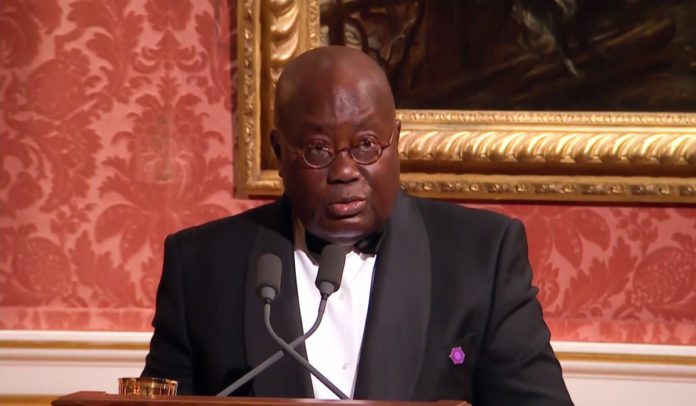President Nana Addo Dankwa Akufo-Addo Wednesday called on West African leaders to adopt new strategies to counter the shared and unprecedented threat of terrorism and violent extremism in the region.
He said though the sub-region’s security management initiatives has helped in the mitigation of extremism and instability, there is the urgent need to tackle the issues of endemic poverty, illiteracy, unemployment and bad governance, as well as the adoption of appropriate technology to achieve the peace, security and economic transformation of West Africa.
The President made the call in Accra when he addressed the opening of a forum aimed at immortalizing the contribution of Kofi Annan, Ghana’s iconic diplomat, to global peace and security.
Top-level political leaders, diplomats and experts are dialoguing on the most critical and evolving peace and security trends on the African continent at the forum, initiated by the Kofi Annan International Peacekeeping Training Centre (KAIPTC), one of the legacies of the Former United Nations Secretary-general, who passed on last year.
Dubbed, the Peace and Security (KAPS) Forum, it would be an annual platform to hatch ideas that would continually champion and ensure Mr Annan’s cause for policies and programmes on peace, security and development are finely balanced for the holistic advancement of the continent.
The KAPS Forum was instituted also to recognize the role of former African Presidents who led their respective countries to undergo major democratic reforms, as well as support global and regional security efforts, especially by providing peacekeepers who risk their lives in dangerous conflict theatres in order to bring peace to the world.
This year’s event held under the theme: “Peace Operations in the Context of Violent Extremism in Africa”, was attended by some past African heads of state including John Dramani Mahama of Ghana, Hassan Sheikh Mohamud of Somalia, Pierre Buyoya of Burundi, General Olusegun Obasanjo of Nigeria, Ernest Bai Koroma of Sierra Leone, Professor Amos Sawyer of Liberia, as well as Mrs Nane Annan, legislators, service chiefs and the diplomatic corps.
President Akufo-Addo said endemic poverty and widespread disillusionment amongst youth in Africa “are not only providing fertile breeding grounds for those who want to cross the Sahara desert on foot and the Mediterranean Sea in rickety boats in the hope of finding a better future in Europe, but also for a new generation of terrorists and violent extremist.
He said the two most active terrorist groups in West Africa- the Al Qaeda and the Boko Haram- have exploited the unacceptable levels of poverty in the areas the operated to recruit and indoctrinate the youth.
In the face of the deepening security challenges in the sub-region, President Akufo-Addo said, it is important that the principles of democratic accountability, individual liberties and human rights and the rule of law was promoted to address the vulnerability of adopting violence to address issues.
He said that when people are covered in the quarters of the rule of law, respect for individual liberties and human rights and the principles of democratic accountability, they see their responsibilities and allegiance to the wider public interest not just of the conveniences of the government but to the collective good of the country.
The President said the growing number of breakaway terror groups coupled with the porous nature of African borders calls for regional and continental approaches to contain the growing threats of terrorist and extremist activities.
He said the coordination of activities between the armed forces and intelligence agencies West African nations “is absolutely essential to successful battle against terrorism,” adding that it is unacceptable that poor countries spent high proportions of their National budgets on defense and security matters to the detriment of necessary expenditures on social concerns.
Ghana, President Akufo-Addo said, was not immune to terror attacks despite the peace and stability the country was enjoying.
“Over the years, we have learnt most often through bitter experience the terrorism and violent extremism are not restricted to particular geographic locations or jurisdictions as impact of a single terrorist incident in one part of the world resonates throughout the world,” he said.
Government, he said, in the effort to address this issue, was determined to deepen the religious tolerance and peaceful coexistence that exists between the majority Christian in the minority Muslim religious groupings in the country.
President Akufo-Addo recalled how in 2015, agents of the so-called Islamic state succeeded in recruiting a few adherents from the Ghana’s university campuses to join the ranks of the groups fighters in Libya and Syria, who were later known to have died in combat.
He said in aid of the global call to end terror activities, Ghana had signed and ratified a number of international instruments aimed at the prevention and suppression of international terrorism.
The contents of those instruments will serve as guides in the formulation of Ghana’s counterterrorism policy, which seeks to prevent acts of terrorism in the country.
“Ghana has adopted the world coordinated interagency approach which encourages the timely sharing of information and intelligence operational coordination and join strategy formulation and has proved essential towards ensuring the efficient execution of the country’s counterterrorism policy.,” President Akufo-Addo said.
The President later cut a sod for the construction of a monument in honour of the late UN General Secretary at the Kofi Annan International Peacekeeping Training Centre at Teshie.
Source: GNA

